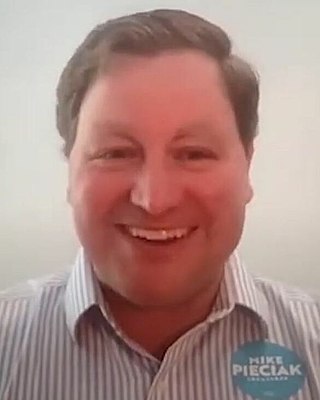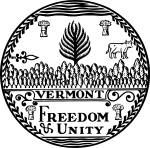
Frederick H. Billings was an American lawyer, financier, and politician. He is known for his legal work on land claims during the early years of California's statehood and his presidency of the Northern Pacific Railway from 1879 to 1881.

Ernest William Gibson Jr. was an American attorney, politician, and judge. He served briefly as an appointed United States Senator, as the 67th governor of Vermont, and as a federal judge.

Peter Thacher Washburn was a Vermont lawyer, politician and soldier. A veteran of the American Civil War, he served as the 31st governor of Vermont as a Republican from 1869 to 1870, and was the second Vermont Governor to die in office.

Levi K. Fuller was an American businessman, military officer, and politician. A Republican, he served in the Vermont Senate from 1880 to 1882, as lieutenant governor from 1886 to 1888, and the 44th governor of Vermont from 1892 to 1894.

The 2000 Vermont gubernatorial election took place on November 7, 2000. Incumbent Democratic governor Howard Dean won re-election. The campaign was dominated by the fallout from the passage of a civil union bill and the subsequent backlash encapsulated by the slogan Take Back Vermont. Ruth Dwyer, the Republican nominee in 1998, ran again in 2000 and was closely tied to the Take Back Vermont movement. Howard Dean, the Democratic governor, favored civil unions and was a primary target of Take Back Vermont.

Levi Underwood was a lawyer and politician from Vermont. Originally a Democrat, Underwood's antislavery views caused him to join the new Republican Party when it was founded. Underwood was most notable for his service as the 23rd lieutenant governor of Vermont from 1860 to 1862.

The 1924 Vermont gubernatorial election took place on November 4, 1924. Per the "Mountain Rule", incumbent Republican Redfield Proctor Jr. did not run for re-election to a second term as Governor of Vermont. Republicans nominated Franklin S. Billings. The Democratic nomination was won by Howard E. Shaw. Shaw died before the general election, and the Vermont Democratic Party selected Fred C. Martin as his replacement. Billings defeated Martin in the general election and succeeded Proctor.

The 1906 Vermont gubernatorial election took place on September 4, 1906. In keeping with the Republican Party's "Mountain Rule", incumbent Republican Charles J. Bell, did not run for a second term as Governor of Vermont. At the start of the year, Percival W. Clement and Fletcher D. Proctor were the leading candidates for the Republican nomination. When it became clear that Proctor had the support of the delegates, Clement ended his campaign for the nomination. He filed as an Independent candidate for the general election and was subsequently endorsed by the Democratic Party. In the general election, Proctor easily defeated Clement.

Frank Elliott Barber Jr. was a Vermont attorney and politician who served as Vermont Attorney General from 1953 to 1955.

The 1867 Vermont gubernatorial election took place on September 3, 1867. In keeping with the "Mountain Rule", incumbent Republican Paul Dillingham was not a candidate for another term as governor of Vermont. The Republican nomination was won by John B. Page, who had previously served as Vermont State Treasurer. The Democratic nomination was won by John L. Edwards of Newport, who had previously served as State's Attorney of Orleans County. In the general election, Page was elected to a one-year term as governor.

The 1865 Vermont gubernatorial election took place on September 5, 1865. In keeping with the "Mountain Rule", incumbent Republican J. Gregory Smith, who had served two one-year terms, was not a candidate for reelection as governor of Vermont. With the election taking during the American Civil War, Dillingham ran as a pro-Union Republican. The Democratic nomination was won by Charles N. Davenport of Wilmington, an attorney and founder of the Brattleboro Reformer newspaper. In the general election, Dillingham was easily elected to a one-year term as governor.

The 1854 Vermont gubernatorial election for governor of Vermont took place on September 5. The Whig nominee was Stephen Royce, former Chief Justice of the Vermont Supreme Court. The Democratic nominee was Merritt Clark, and Lawrence Brainerd ran as the nominee of the Free Soil Party even as he was one of the organizers of the new anti-slavery Republican Party and appeared as a Whig candidate for the Vermont Senate on the ballot in Franklin County. Whig William C. Kittredge was nominated for governor against his wishes by advocates of the Temperance movement and Democrat Horatio Needham also attracted the support of some Free Soil advocates.

The 1855 Vermont gubernatorial election for governor of Vermont was held on September 4. With the Whig Party defunct after 1854, incumbent Stephen Royce, who had run with the support of both Whigs and the new Republican Party in 1854, ran as the nominee of the Republicans. The Democratic candidate was Merritt Clark, who had run unsuccessfully against Royce in 1854. James M. Slade, the Clerk of the Vermont House of Representatives was the nominee of the Know Nothing Party, also called the American Party.

The 1856 Vermont gubernatorial election for governor of Vermont was held on Tuesday, September 2. In keeping with the "Mountain Rule", incumbent Republican Stephen Royce was not a candidate for a third one-year term. The Republican nomination was won by Ryland Fletcher, the incumbent lieutenant governor. The Democratic nominee was Henry Keyes, a former member of the Vermont House of Representatives and Vermont Senate.

The 1862 Vermont gubernatorial election for governor of Vermont was held on Tuesday, September 2. In keeping with the "Mountain Rule", incumbent Republican Frederick Holbrook was a candidate for a second one-year term. The Democratic nominee was Benjamin H. Smalley, who had been on the ballot in 1861 as the gubernatorial candidate of the "Peace Democrats," who favored compromise with the Confederacy.

Michael S. Pieciak is an American politician from Vermont. A member of the Democratic Party, Pieciak has served as Vermont State Treasurer since January 2023.

Charity Rae Clark is an American lawyer and politician from Vermont. A member of the Democratic Party, she has served as Vermont Attorney General since January 2023.

Charles N. Davenport was an American attorney, businessman, and political candidate from Vermont. A Democrat during the American Civil War and post-war era when Republicans won every election for statewide office, Davenport was an unsuccessful candidate for offices including governor and U.S. representative. He was a delegate to many local, state, and county Democratic conventions, and was the founder of the Brattleboro Reformer newspaper.





















